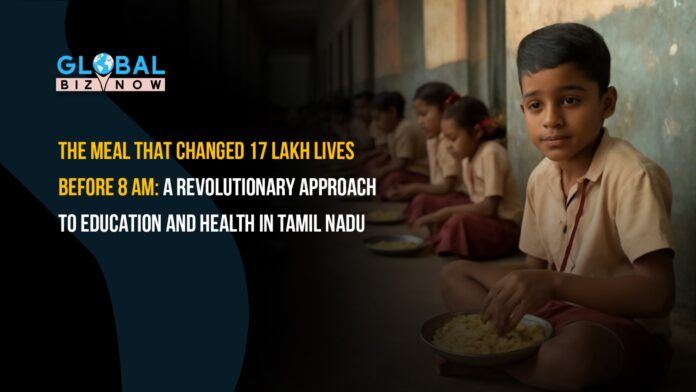In a world where the barriers to education often seem insurmountable, a simple yet profound change has taken place in Tamil Nadu that is transforming the lives of millions of children before the school bell even rings. It’s a change so fundamental, yet so powerful, that it has led to a wave of positive impact across the state. This is the story of how one humble meal is changing 17.5 lakh lives — all before 8 AM.
The Silent Revolution:
It’s 7:45 AM in a small village school in Tamil Nadu. The sun is still low in the sky, but the school grounds are already buzzing. Little feet aren’t running away from school; they’re eagerly heading toward it. These children, often tired and hungry, are arriving early and with a smile. What’s more remarkable is the fact that their attendance has soared to 95%, a feat that many educational institutions across the world would envy.
The school’s transformation isn’t just in numbers — it’s in the very fabric of its students’ health, engagement, and overall well-being. The days of children fainting during morning assembly or frequently visiting the hospital are behind them. Even handwriting and memory retention have significantly improved.
But how did this happen?
A Transformative Meal:
It wasn’t a new curriculum or a sophisticated digital learning lab that made this change possible. It was something far simpler — a warm, nutritious meal served every morning. This initiative, implemented across over 34,000 schools, now feeds 17.5 lakh children in Tamil Nadu before class starts. At a mere cost of ₹12.75 per child per day, this meal packs not just nutrition but also the promise of a brighter future.
The results? Remarkable. Studies show that school attendance has increased, illnesses have dropped by 70%, and rural children’s hospital visits have reduced by nearly 68%. Children are now sharper, more confident, and participate more actively in class. Parents are astonished to hear their children ask, “Why isn’t the food at home like the school food?”
The meal has become more than a source of nutrition — it has become a symbol of care, dignity, and opportunity.
A Personal Story of Transformation:
Take the case of Senthil from Karur district. His mother, a daily wage worker, used to leave early in the morning, and Senthil often skipped breakfast, leading to frequent fainting spells and poor grades. Today, thanks to the morning meal initiative, Senthil wakes up early, eats with his friends, plays, smiles, and excels in class. His mother no longer feels guilty for leaving him to fend for himself, as the state has stepped in to provide not just food, but hope.
For Senthil and countless others, this meal isn’t just food. It’s a lifeline, a dignity, and a silent prayer answered.
The Numbers That Matter:
Every meal served provides essential nutrition: 293 calories, 9.85g of protein, 20.41mg of iron, and 1.64g of calcium, with the added bonus of millets twice a week for enhanced nutrition. The impact is reflected in the improvement in learning outcomes: the ability to follow instructions has increased from 91% to 95.5%, while learning new material has gone up from 88% to 92.5%.
And the best part? This scheme is now a permanent fixture in all government and aided primary schools across Tamil Nadu, covering an additional 2.23 lakh children from 3,995 aided schools as of July 2025. With an annual budget of ₹500 crore, this initiative is not just an investment in food but in the future of Tamil Nadu’s children.
The Political Legacy of Care:
This is not just a welfare scheme; it is the culmination of a long-standing legacy of social justice through food in Tamil Nadu. The roots of this initiative go back to the 1920s, when the Justice Party introduced free noon meals in Madras Corporation. In the 1950s, K. Kamaraj extended it to rural areas. MGR universalized it in the 1980s, and Kalaignar Karunanidhi further enhanced it by adding eggs and variety to the meals.
Now, M.K. Stalin has taken this legacy a step further by moving the first meal of the day to the morning, ensuring that the most vulnerable children receive their essential nourishment before school even begins. This is not charity — it is justice served hot, before 8 AM.
The Bigger Picture:
Some may argue that feeding children is a family responsibility, but the truth is that these children didn’t choose to be born into poverty, malnutrition, or absenteeism. All they wanted was a chance to learn, and thanks to this meal, they are now learning more than ever before.
Attendance, health, and hope have all increased, and these children are now equipped to overcome the hurdles of their circumstances. The impact of this program is immeasurable, and perhaps the real question is: Can any exam result truly measure the value of this transformation?
A Call to Action:
This is not about party politics. This is about the shared responsibility to feed our children, to provide them with the tools they need to succeed. The impact of this policy is not just visible in Tamil Nadu but can inspire the entire nation. Other states should not only study this initiative — they should emulate it.
Because when we feed a hungry child, we don’t just fill a stomach. We unlock potential, and we build the India of tomorrow.
In Tamil Nadu, thanks to one powerful policy, every child answers a question before they even pick up a pencil: “Did you eat today?” And the answer, every single day, is a resounding yes. GBN

